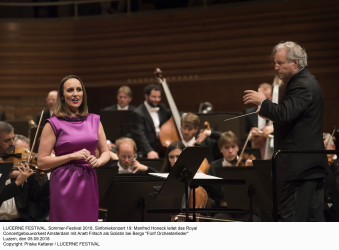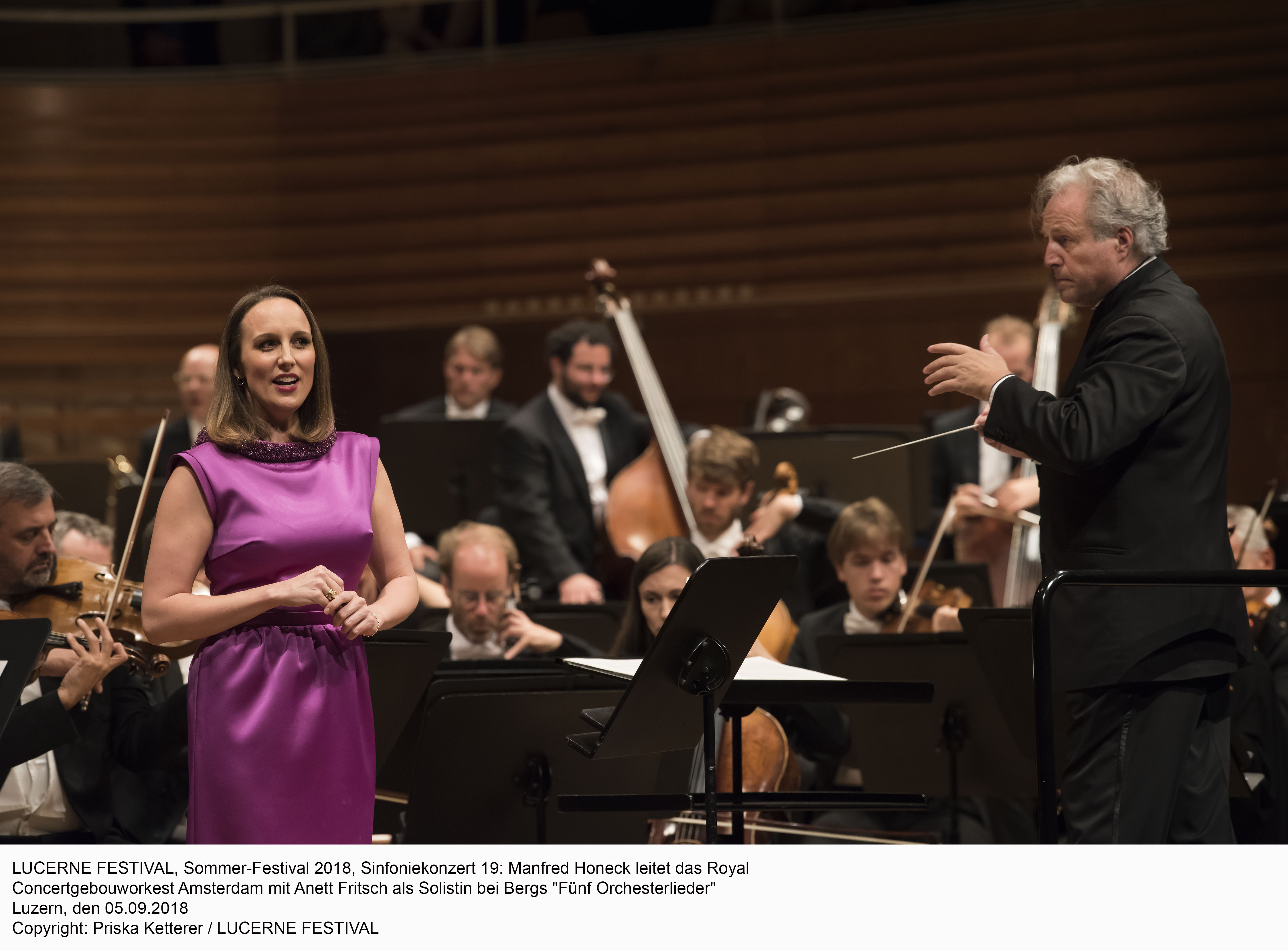
 Switzerland Lucerne Festival [3] – Wagner, Berg, Bruckner: Royal Concertgebouw Orchestra Amsterdam / Manfred Honeck (conductor), Anette Fritsch (soprano) Kultur- und Kongresszentrum (KKL) Luzern, Lucerne, 5.9.2018. (JR)
Switzerland Lucerne Festival [3] – Wagner, Berg, Bruckner: Royal Concertgebouw Orchestra Amsterdam / Manfred Honeck (conductor), Anette Fritsch (soprano) Kultur- und Kongresszentrum (KKL) Luzern, Lucerne, 5.9.2018. (JR)

Wagner – Prelude to Act III from Die Meistersinger von Nürnberg
Berg – Five Orchestral Songs Op.4
Bruckner – Symphony No.3, WAB 103 (Nowak edition, third version 1889)
Daniele Gatti was to have conducted this concert and the Concertgebouw did well to engage Manfred Honeck at fairly short notice; Honeck elected not to change the programme, for which he deserves much credit. It was therefore a pity that there were many empty seats; I suspect this was nothing to do with the change of conductor but with the programme. The mere mention of Berg can put some people off, and Bruckner’s Third Symphony is not one of his ‘popular’ or well-known symphonies, even though Bruckner is now popular (the Vienna Philharmonic perform his Fifth Symphony in a few days’ time under Welser-Möst; the Munich Philharmonic just played his Fourth under Gergiev).
We started off with the Prelude to Act III of the Die Meistersinger. This was given rather a slow reading short of nuance, out of context without the rest of the opera, and consequently a mite dull; however, the glorious cello section of the Concertgebouw shone from the outset. It made for a pleasing curtain raiser and orchestral warm-up. Everyone was more curious to hear the Berg and savour the Bruckner.
The Berg songs need some explanation and background. Berg was still a teenager when he started his composition studies in 1904. He joined other radical young composers for lessons in Vienna with Arnold Schoenberg. His Five Orchestral Songs Based on Picture Postcard Texts by Peter Altenberg date from 1911-12 and represent his first full use of the resources of a symphony orchestra. Peter Altenberg (pen name of Richard Engländer) was a well-known but rather disturbed poet, known to Kafka; the texts Berg chose to set to music are transcendental and fragmentary – for example ‘Über die Grenzen des All blicktest du sinnend heraus’ (‘Over the brink of beyond [the Universe] musingly wandered your gaze’ gives you a flavour) – and could fit on the back of a picture postcard, hence the name. The work earned a place in music history by having incited the famous ‘scandal concert’ on 31st March 1913 at Vienna’s Musikverein (two months before the Rite of Spring caused a riot in Paris). There was mayhem, police were called; the performers gave up. Civil proceedings were instituted. Luckily, Berg was not present to witness the fiasco, but was disheartened and never published the set; it remained unperformed until after his death. Listening to it today, of course, we wonder what all the fuss was about, but 100 years ago it must have been a shock to conservative and delicate European ears. German soprano Anett Fritsch proved the perfect interpreter; the vocal score is not easy, but she mastered it with ease. Top notes were rightly piercing but not shrill; diction crisp, intonation faultless. The pieces are melancholic in nature, which does not help. However, the orchestration is wondrous, tinkling percussion to signify the falling snow, which opens and closes the set. It should have been evident to the audience at the première that the young composer would go far. Fritsch received generous applause for her virtuosity. The police did not need to be called.
Bruckner was already middle-aged by the time he came to write his Third Symphony in 1877. The Third is the first of his symphonies to be played relatively often nowadays, the earlier symphonies that include numbers 0 and even 00 remain rarities on the concert platform. Bruckner revised this symphony more times than any other, removing musical references to his idol Wagner in the process. It remains a slightly disjointed work but satisfying nonetheless. The leading critic in Vienna, Eduard Hanslick, wrote ‘Instead of a critique, we humbly confess we have not understood his gigantic symphony…we could not grasp its musical coherence’. Even today, with its abrupt pauses, there is a great deal of stop-start, so that the symphony never seems to flow. There are however wonderful slabs of sound rather like Mark Rothko, Howard Hodgkin or Sean Scully paintings. Honeck, sharing both homeland and faith with Bruckner, confirmed his credentials as a very competent Brucknerian, and his recent release of the Fourth Symphony has garnered much praise. The orchestra gave their all; double basses were conspicuously busy, woodwind shone across the board. The Concertgebouw have a warm, mellow, blended sound, which is just perfect for the Mahler and Bruckner symphonies they regularly play. For the second concert of their Lucerne Festival programme, Haitink steps in for Gatti though the Mahler symphony has been changed from number 7 to number 9.
In the opening movement of the Bruckner, Honeck built up the many grandiose climaxes most deftly, and the acoustic of the KKL proved its worth – the acoustic engineers were the same that were employed by Symphony Hall in Birmingham. Broad sweeping gestures were on hand to guide the orchestra through the slow movement. Honeck’s Viennese background (although he comes from the region of Vorarlberg, which is the western part of Austria bordering on Switzerland, he was a viola player with the Vienna Philharmonic for many years) assisted him with the Ländler of the Scherzo and made me wonder why Vienna has not chosen him yet to conduct the Neujahrskonzert. His name may not yet be ‘big’ enough, but he is more Viennese than many who have gone before him, and on this evidence, and also superb concerts I have heard him conduct with the Tonhalle Orchestra Zurich, he ought also to be a strong contender to take over the Concertgebouw if he were willing to terminate Pittsburgh.
The final page of the last movement was a glory, even if Honeck could not convince us this work is a masterpiece.
John Rhodes

Berg may not exactly be good for box office but could not the number of empty seats reflect the astronomical cost of tickets at this festival – surely the most expensive in Europe. Last week I saw concerts by the Berlin Philharmonic and Boston Symphony at London’s Proms. Best stalls seats cost me in the region of £50 whereas something similar at the KKL would be a staggering 320 Swiss francs (256)!
The Lucerne Festival is undoubtedly much more expensive than the Proms (I am a former long-time Arena Promenader which was spectacular value even though one got no seat – I was younger then). Other European Festivals (Salzburg, Bayreuth for example) are equally pricey; the exchange rate £/CHF does not help the Brits as Richard Morrison pointed out in his recent review in ‘The Times’. The cheaper seats are quickly snapped up by ordinary folk, the expensive ones are often taken for corporate entertaining (and some very wealthy burghers and international music tourists); it’s the ones in the middle which fall between two stools, at the back of the lower balconies and sides – they can remain empty if the programme is less popular. Nevertheless the Festival achieves high attendance levels on average. And the acoustics are splendid.